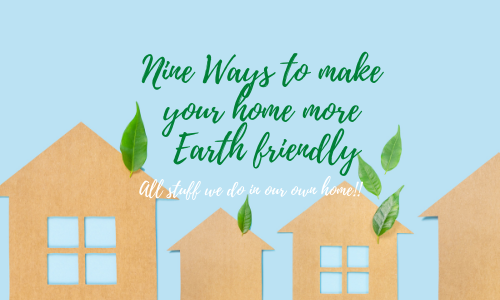Ways to make your home more Earth friendly!
Use cloth napkins for meals and cloth rags in lieu of paper towels— Growing up, we always used cloth napkins. Not only do they elevate your daily dining experience, they also are more eco-friendly. I have nice linen ones for when guests come for dinner, but for daily use we rely on bar mop type towels, which are larger and more absorbent than paper napkins. When they become a bit worse for the wear they are relegated to the cleaning rag bin. Did you know that every day in the US, 3000 tons of paper towel waste is created—and it took 51,000 trees to create each of those 3000 tons? That’s a mind-blowing 18,615,000 trees a year (yes, over eighteen billion)! I only use paper towels to clean areas like the toilets, or some other areas that may contain bacteria harmful to health (like raw meat juice, or something, blech!). The rest of the time we use cloth, and once weekly I run a wash load of them through the sanitize cycle, where they are disinfected without harsh chemicals. This actually saves a lot of money as well—paper towels are pricey!
Turn down your water heater— Summer is fast approaching, and we Tucsonans know that the water comes out of the tap pretty darn warm from May until the end of September. Not many people like to take a super-hot bath in June here. Turning your water heater down during these months to 115° will prevent the hot water heater from needlessly firing up. (Now, if I could just figure out a way to get cold water out of the taps afternoons in July to wash salad for dinner!)
Consider your window treatments— In April, as the temperatures begin to rise a bit and the sun cascades through the windows for longer periods of time, homes in the Tucson area can heat up quickly. We take a few moments to swap out our “winter curtains” (white Dupioni silk-style light filtering ones) for the “summer curtains” (opaque teal velvet ones—which sounds terrible but actually look quite good). These make a tremendous difference in the large floor to ceiling plate glass windows in our 1969 Oro Valley home that face directly east. By utilizing lined or heavier drapes in the summer, and strategically closing and opening them depending on the sun’s orientation, you can save on your monthly electric bill and gas bill as well as prolonging the life of your A/C system.
Opt out of junk mail— Not only does it create waste, junk mail also takes up your time and energy sifting through it. Banish it for good just by visiting a few websites. Here are 4 easy steps to rid your mail of excess junk.
Meal planning to reduce waste— Food waste hovers around 30-40% in the United States—and we are not even the worse offenders. While a good portion is at the retail level (overordering, faulty machinery, culling produce die to blemishes, etc.), the average American wastes 1 pound of food per day. I know I have been guilty of purchasing produce that we did not eat in a timely fashion and had to pitch (admittedly, quite a few times, ugh) —and poor planning was the culprit. Now I try and plan meals in advance and calculate realistically how much we will actually use to prevent overbuying. It has really helped—and we now also use a neat little product called a BluApple in the produce drawer to extend the life of fruits and veges. Here’s another tip—if you shy away from frozen fruits because defrosting the in the microwave turns them to mush, invest (or recycle) some glass jars for fridge defrosting. I eat blueberries every day (yep, everyday!) and I simply dump a bunch of frozen berries into a wide mouth glass jar and thaw them overnight in the fridge. They will keep for almost a week that way. (Sidenote—wide mouth glass jars are super for holding leftovers of all kinds—and more earth friendly than plastic containers or wrap!)
Consider buying used— There is no shame in my game regarding buying used items. Although I use a Kindle most of the time, when I do want to purchase a hardback or paperback book, I always go to a used book site first. Not only are they much less expensive than a new copy, but you may even score out-of-print titles. Searching vintage stores or auction websites for unique gifts for friends and family tailored to their interests can yield items that the recipients will treasure more than you can imagine. One of my pet peeves is how the fashion industry forces trendy styles that not everyone cares to wear (or finds flattering). Looking for a pair of jeans from the early 2000’s that don’t have a super high waist? What about a sweater that covers your stomach (what is with all the cropped shirts today??). Try a site like Poshmark or ThredUp. (You can also sell your clothes through these sites.) In addition to finding items you love, you are helping keep clothes out of landfills, and reducing the need to create new clothes. Did you know that the “fast fashion” industry is responsible for one- tenth of the water used industrially to run factories and clean products?
Take control of your micro-climate with trees— We can say from experience that planting trees strategically can provide cooling shade that will absolutely help cool your yard and home. The trick is planting them at the right orientation to the sun and close enough to help shade the house—but not close enough for roots to cause damage to your home. Tucson Electric Power (TEP) even has a program where you can buy 3 five-gallon trees for $5 each through their “Trees for You” program. Encourage your neighbors to join you in planting trees and the results will be even better. Also, did you know that mature trees can add value to your home when you sell?
Get a “smart” thermostat— If you haven’t already, consider purchasing one of these. Most not only help you save energy, but allow you to track your usage and operate remotely via your smartphone—great for snowbirds and those with a second home or investment rental home.
Laundry Tips— Consider purchasing a front loader washing machine. They use 40% less water and also remove more water during the spin cycle, cutting down on dryer time. On that note, unless you are washing something with oily stains, set your water temperature to cold. Heating the water can account for up to 90% of energy used by the washer. In lieu of using fabric softener, try out some dryer balls. I don’t care for the plastic ones with the nubs (I think they are hard on clothes), but I found some great wool dryer balls to use instead. Bonus—you can place a few drops of your favorite essential oil on them to scent your laundry if you like (let them dry before you use them, and don’t use too much).


